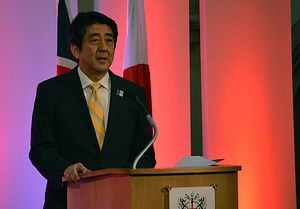Japan’s global favorability continued to nosedive mostly due to its growing unpopularity in South Korea and China, according to a prominent global poll. The same poll found that nuclear-armed nations are particular unpopular as well.
This week, the BBC released its annual BBC World Service poll, which rates 16 nations and the EU’s popularity. The poll is based on the responses of 24,542 people in 24 countries around the world between December 2013 and April 2014.
Among the interesting findings of the poll is that Japan’s favorability continues to slide, primarily as a result of its growing unpopularity in China and South Korea. As recently as 2012, the BBC World Service poll found Japan to be the most popular nation in the world. Last year — which was the first time the survey was conducted following Japan’s nationalization of the Senkaku Islands and the election of Shinzo Abe as prime minister — Japan fell to fourth place after its popularity declined by an average of seven poll points.
This year that average fell again by an average of two poll points, leaving it with a favorability rating of under 50 percent (49 percent). This still left it as the fifth most popular nation in the survey. Much of the decline can be attributed to Tokyo’s growing unpopularity in South Korea and especially China. In the latter, 90 percent of respondents held a negative view of Japan. This was a record high for the BBC World Service poll and up an astonishing 16 percent from the year before.
The poll also found that of the 16 nations and the EU, Iran, Pakistan and North Korea are viewed the most negatively. Iran was the least popular of the three with only 16 percent of respondents expressing a favorable opinion and 60 percent viewing the Persian Gulf country negatively. Only 16 percent of respondents expressed favorable opinions of Pakistan as well, while 58 percent of those being surveyed viewed the country unfavorably.
Remarkably, North Korea was the most popular of the three countries, with 19 percent of respondents saying they hold a positive view of the Hermit Kingdom. Like Pakistan, however, 58 percent of respondents said that they viewed North Korea unfavorably.
Interestingly, with the exception of those in Europe, nuclear-armed nations seem to be viewed in a particularly negative light. The six nations that were viewed the most negatively — Iran, Pakistan, North Korea, Israel, Russia and India — all possess nuclear weapons or are believed to be seeking them (in the case of Iran). Eight of the ten nations that scored the lowest in the poll are nuclear-armed countries. Beyond the six already listed, China and the United States were ranked as the ninth and tenth least popular nations respectively. The eighth least popular nation, South Africa, used to possess a small nuclear arsenal but voluntarily dismantled it in the waning days of the apartheid government.
There’s no indication that the unpopularity of these nations had anything to do with their nuclear status, however. In fact, the United Kingdom and France both have nuclear weapons and they ranked as the third and fourth most popular nations in the survey. The fact that South Africa remained fairly unpopular despite voluntarily dismantling its arsenal also suggests that the correlation between nuclear status and popularity should not be mistaken for causation.
Furthermore, nuclear-armed countries make up a disproportionate number of the ones included on the survey. All nine nuclear-armed powers and Iran were included in a survey that only asked about 17 nations and international organizations altogether. At the same time, the respondents to the survey — which is what the rankings are derived from — weren’t as heavily concentrated in nuclear weapon states. As noted above, the poll is based on the opinions of people in 21 different nations. Israel, Iran and North Korea were not among those nations and each country’s ranking excludes the responses given by people who lived in that country. Thus, the rankings for nuclear-armed countries came disproportionally from the responses given by residents of non-nuclear weapon states.

































